Farmers’ Clubs Project in Zhenkang County, Yunnan
Source:Humana People to People ChinaDate:2014-05-07 00:00:00Click:1257
Project Background
Zhenkang County - a nationally designated poverty county - is located in Lincang City in the south-western part of Yunnan province, bordering Myanmar on the western side. 98% of the region is mountainous. The total population is 170,000, with 23 ethnic minorities, including Yi, Wa, Dai, De’ang, Bulang, Lisu, Lahu, Miao and many more. Ethnic minorities constitute 31.7% of the total population in Zhenkang.
Being one of the 25 peripheral border counties in Yunnan, Zhenkang currently has 51,900 people living in impoverished conditions; out of this group, 15,300 people are living in absolute poverty, while 39,600 people are low income earners.
Project Initiation
In July 2008, Humana People to People China initiated its first ever Farmers’ Clubs Project in China – the ‘Zhenkang County Farmers’ Clubs Project’ [‘FC’] as part of the 5-year ‘Humana People to People Comprehensive Poverty Alleviation Project’. With the support from members of ‘The Federation for Associations connected to the International HUMANA PEOPLE TO PEOPLE Movement’ (FAIHPP), the project was launched into action.
HPP partnered with the Foreign Capital Poverty Alleviation Project Management Center of Yunnan Province and Zhenkang County Poverty Alleviation Office to establish a Zhenkang County Project Management Office.
In the FC project households are encouraged to participate and form mutual-help groups which we call “Farmers’ Clubs”. Each club has usually 30-50 member household and receives training on rural sustainable development and production methods. The ultimate purpose is to help farmers achieve an sustainable and community driven increase of agricultural yields and income.
By the end of 2013, the project saw a successful closure. The project reached15 natural villages of 3 administrative villages of the two townships Nansan and Mengdui. A total of 750 farming households (4000 people) benefitted from the project.
Project Activities
1. Pig breeding
The project in Zhenkang County introduced the technology of fermentation beds to replace the traditional pig pens, making the pig breeding activity cleaner and better organized. Pigs also love the soft padding of the fermentation bed and grow better in this new environment due to less illness and more comfort. The technology was very welcomed by the pig raising households.
At the same time, a pass-on grants activity was implemented where all participating pig raising households who benefited from project subsidies obligatorily passed a piglet onwards to a new participating household once their sows have given birth. This mechanism ensures the sustainability of the project in the long run.
As the first HPP Farmers’ Clubs project in China, Zhengkang served as an exemplary pilot, setting an example for other new HPP projects. Zhenkang project staff would sometimes visit other project sites to assist and share their expertise on the fermentation bed and other technologies introduced by the Zhenkang FC project.
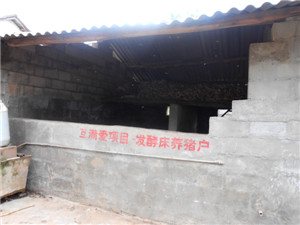
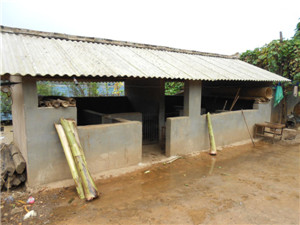
A pig pen construction upon completion
2. Asian bamboo rats breeding
In order to increase the income of farmers, the project team introduced Asian bamboo rats into Zhenkang County for breeding and meat sales.
Introduction to bamboo rats (Source: Baidu Baike): The bamboo rat gained its name from the habit of eating bamboos; wild bamboo rats are extremely rare. The Bamboo rat species can be found in East-Africa, tropical South-Asia, sub-tropical forests/bushes and bamboo forests. The species has high market value owing to the demand for its fur, meat and medicinal uses; currently it is being bred commercially at a large scale and sold in markets. Thus the breeding of bamboo rats has become an economically viable agribusiness for many. The bamboo rat used both for meat sales and its bi-products is sought after in markets in China and abroad. In China, the bamboo rat has entered consumer markets in the south part of china as well as large cities in the western part of China, the rate of demand is increasing at 3% per a year.
The project both provided animals, technical support and regular trainings to farmers on bamboo rat raising techniques.
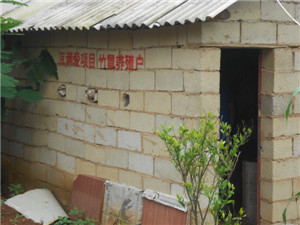
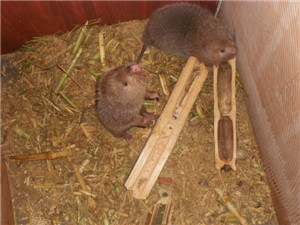
3. Corn cultivation
The project team introduced the “wide-narrow alternating rows” technique for planting corn crops; technical assistance is provided to guide farmers through the new planting technique. Initially the project led a small group of farmers to begin experimenting the new technique on a few demonstrative pilot plots. Later when other households saw that the technique being applied to the pilot plots did result in up to 30% higher yields, they also decided to participate in the project to learn the new cultivation method.
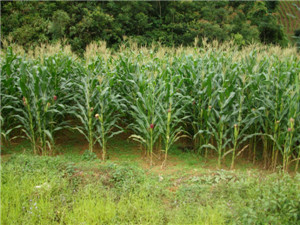
Corn cultivated by the “wide-narrow alternating rows” technique is growing strong
4. Dendrobium planting
Dendrobium is commonly used in Chinese herbal medicine, due to its high market value the project team considered it a suitable crop to introduce to the farmers for commercial cultivation. The project team introduced dendrobium seeds to the households, and in conjunction hired farming instructors to provide training and regular monitoring to assist the farmers’ cultivation of the new plant.
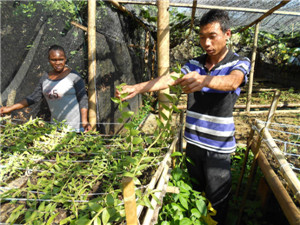
The growth of the dendrobium plant is in excellent condition
5. Taro planting
The project team organized households to grow taros as an additional line of activity for increasing incomes.
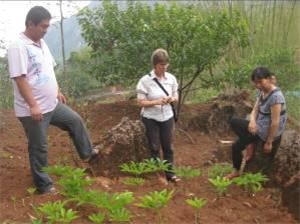
Planting taros
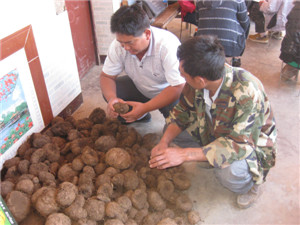
A project leader checking the taro harvest
6. Training
The project provides regular trainings for the farming instructors, with higher levels of personal capacities the farming instructors are then better equipped to assist and guide the farmers.

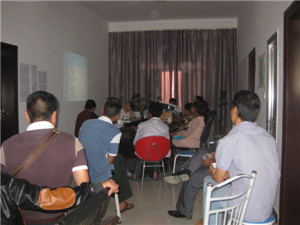
Training session for the farming instructors
For the farming households, we also deliver trainings on agricultural techniques, health awareness, and gender-equality awareness; we want to support people to lift themselves out of poverty by changing their attitudes, skills and dreams of the future.
7. Solar water heater installation
The project subsidizes farmers for purchasing of solar water heaters. The project team purchases a batch of water heaters then distributes to the households, with the project subsidy farmers are only required to pay a small amount for the facility. We also assist famers with the installation, the households are very happy that they can now enjoy a warm shower in their house.
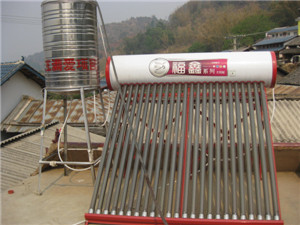
Solar water heaters subsidized and installed by the project
8. Water collection tanks
This is a sub-project under the Luxemburg Embassy sponsored project “Water for Life”. In three project villages, we mobilized villagers to construct water tanks for collecting water. Villagers together decide on the locations for building the tanks, and then the project team collectively purchases the concrete and materials needed for the construction to distribute to the villagers for building 300 mountain water collection tanks. After the construction is complete, the project team does a final quality inspection before the tanks are used. Each tank can store 2-3 tons of rain water to be used for irrigation and domestic use.
The villagers are completely involved in the process of selecting the sites of construction and the building of the tanks. They are fully participating in this initiative to solve the local water-use issues, thus cultivating a sense of ownership of the newly constructed water storage facilities – it can be assured that in the future they will be the ones actively maintaining the facilities and conducting repairs needed. The concern for project sustainability is manifest in HPP’s project design.
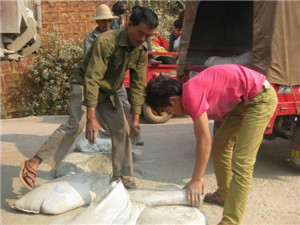
Distributing concrete to the villagers
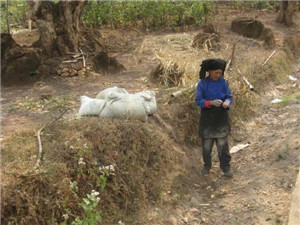
This lady collected 4 bags of concrete for constructing the water tank
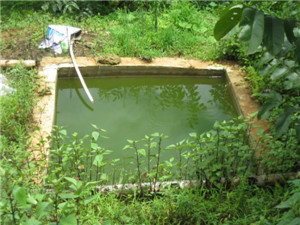
A completed water tank construction
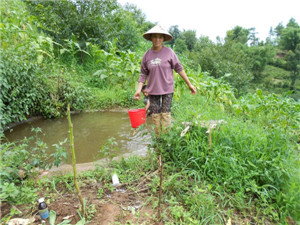
A villager collecting water from the tank
9. Construction of public toilets and garbage pools
The project team organized the construction of public toilets and garbage pools to improve the hygiene conditions in the village; furthermore they also mobilized villagers to carry out community clean-up actions.
In some project villages with HPP POFs (Preschools of the Future), the toilets would be constructed adjacent to the POFs to convenience the toiletry needs of children, parents and teachers.

A public toilet in Huyu Village
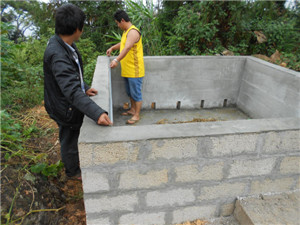
Project team inspecting a completed construction of a garbage pool
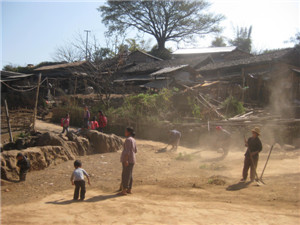
Community clean-up action in the village
Project Updates
1. Zhenkang Farmer’s Clubs: Instructing farmers on managing early germination period of dendrobe
http://www.hppchina.org.cn/en/newshow.asp?id=967

















